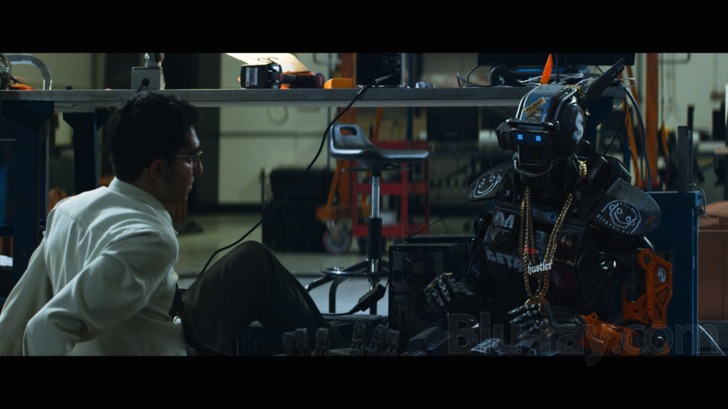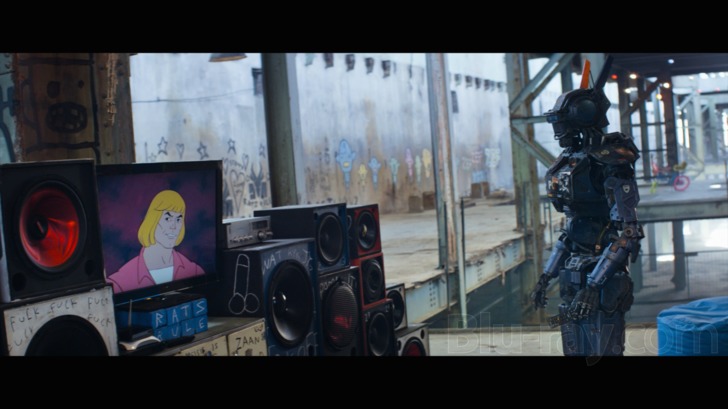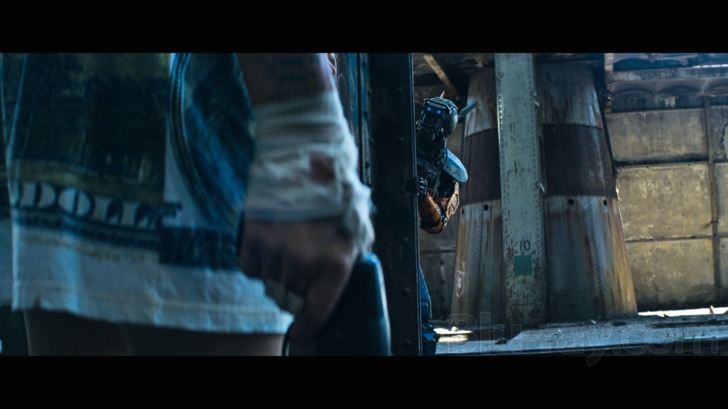Chappie Blu-ray Movie
HomeChappie Blu-ray Movie 
Blu-ray + UV Digital CopySony Pictures | 2015 | 120 min | Rated R | Jun 16, 2015
Movie rating
6.7 | / 10 |
Blu-ray rating
| Users | 3.5 | |
| Reviewer | 4.0 | |
| Overall | 3.5 |
Overview
Chappie (2015)
Chappie tells the story of a robot imbued with artificial intelligence who is stolen by two local gangsters who want to use him for their own nefarious purposes.
Starring: Sharlto Copley, Dev Patel, Ninja, Yo-Landi Visser, Jose Pablo CantilloDirector: Neill Blomkamp
| Action | Uncertain |
| Sci-Fi | Uncertain |
| Thriller | Uncertain |
Specifications
Video
Video codec: MPEG-4 AVC
Video resolution: 1080p
Aspect ratio: 2.40:1
Original aspect ratio: 2.39:1
Audio
English: DTS-HD Master Audio 7.1 (48kHz, 16-bit)
French: DTS-HD Master Audio 5.1 (48kHz, 16-bit)
Spanish: Dolby Digital 5.1 (640 kbps)
Thai: Dolby Digital 5.1 (640 kbps)
Subtitles
English, English SDH, French, Spanish, Cantonese, Indonesian, Mandarin (Simplified), Mandarin (Traditional), Thai
Discs
50GB Blu-ray Disc
Single disc (1 BD)
UV digital copy
Packaging
Slipcover in original pressing
Playback
Region free
Review
Rating summary
| Movie | 3.5 | |
| Video | 5.0 | |
| Audio | 4.5 | |
| Extras | 3.0 | |
| Overall | 4.0 |
Chappie Blu-ray Movie Review
Reviewed by Martin Liebman May 29, 2015Chappie isn't the first movie to explore artificial intelligence, the blurring of the line between what man makes and what makes a man, and it certainly won't be the last. The film, from Director Neill Blomkamp (District 9, Elysium), navigates through fairly well-worn territory but efforts to spice up the story with a rather unique creation of a "gangster robot" that quickly evolves from a childlike state of curiosity, fear, and doubt to become not a killing machine but quite the opposite, a machine capable of understanding both the fragility of life and the lasting power of the human condition. The picture admirably aims to tackle deep philosophical issues through both broad stoke overtones and subtle nuance alike, and for the most part it succeeds. Even the unorthodox lead character and the environment in which it finds itself is a great asset considering the almost immediate juxtaposition it faces in its existence, one that places it squarely in the middle of the best and worst man has to offer: tenderness, compassion, and a willingness to help and create and preserve on one side and man's destructive nature and greed on the other. While the movie doesn't really break any new philosophical ground, it explores timely questions and does so in trademark Blomkamp style that blends creative technical genius with epic action and intimate passion.

Who am I?
Johannesburg has become a dangerous city. Crime is on the rise and police are dying in record numbers. The city is combating the dangers with a new army of robotic police officers purchased from a corporation called "Tetravaal." The humanoid bots are programed to strike hard and protect human officers at all costs. They're the brain child of a brilliant designer named Deon Wilson (Dev Patel) whose ultimate goal is to create a fully realized and feeling robot. The company is also supporting development of a larger, more aggressive remotely controlled fighting machine known as "Moose," created by an ex-soldier named Vincent Moore (Hugh Jackman). One of Wilson's robots is destroyed in a shootout with a gang. When several criminals -- Ninja (Ninja), Yolandi (Yoldani Visser), and Amerika (Jose Pablo Cantillo) -- fall prey to a dangerous criminal (Brandon Auret) who demands they pay him $20,000,000, they hatch a desperate plan to kidnap Wilson and take control of the robots to do their dirty work. But the kidnapping goes better than expected. Wilson is nabbed with the destroyed robot in his possession. He makes the necessary repairs and uploads a program that will empower it with self awareness. But a damaged battery gives it only days of functionality. Yolandi takes it under her wing and calls it "Chappie." The robot slowly learns what it means to be alive and is tricked into aiding the criminals get their money with a promise of an extended existence.
Of all of the "man vs. machine, man as machine, machine as man" movies out there, Chappie most closely resembles RoboCop, and the similarities are often uncanny. Certainly the pictures deal in similar themes as they relate to the essence of man carrying over from the organic to the inorganic, that the essence of an individual exists beyond the physical body as something less tangible and more metaphysical. In RoboCop that was memory. In Chappie it's consciousness, in other words a sense of self and self-awareness that one exists, that one is made of experiences and the accumulated influences of other people, be those influences crudely programed in by code, shared in a warm embrace, or, on the other extreme, learned the hard way in a trial by fire in the real world. Chappie explores all of those arenas during its "second" life as a more self-aware machine, beginning as if an infant and maturing through the process to wrestle with deeper philosophies that center around both the tangible and abstract concepts of life alike.
It's here where the movie's greatest strengths lie, and it's also here where it's greatest weaknesses may be found. There's nothing evolutionary about the way Chappie tackles the questions its raises. The movie efforts, nobly, to blend deep psychological, philosophical, and metaphysical concepts with rough-and-tumble action (that's nowhere near as blood-soaked as Blomkamp's other films but no less effective as pure entertainment) but always feels like it's favoring style over substance, even as the movie at least makes sense of Chappie's evolution from curious child to bling-bling gangster to more deeply aware individual. But the film uses that avenue to its benefit, building in Chappie the classic outsider who wants to be wanted, to feel needed, to do whatever is necessary to fit in. There's character growth on both sides of that equation but that naivetÚ that drives Chappie helps to reinforce complicated concepts in, oftentimes, the simplest terms possible. Even still, and for as well as the movie handles all of its baseline requirements and tries its hardest to keep it all fresh, there's a certain hollowness to it, a feeling that it only scratches the surface and repeats what others have done before rather than try and forge a new path with new ideas and revolutionary visions about what it means to be alive in the digital and mechanical world.
Chappie also resembles RoboCop in the broader arena of general ideas and exterior plot elements. Both movies center around a crime infested city that's taken to drastic measures to solve the problem, bringing robotic policing into the picture to support, and perhaps even eventually replace, human beings. There are two models, the more human-shpaed entity from which Chappie originates and the larger, more menacing, more mechanical "Moose" that's not a dead ringer for ED-209 but the resemblance is unmissable, both in look and context. There's a slight reversal here whereby Chappie evolves into something resembling a human whereas in RoboCop the title character reverts back to Alex Murphy. There's the large corporate entity behind it all and even the abandoned, deteriorating setting where much of the raw thematic conceptualization and development takes place. It's disappointing to see Blomkamp's film borrow so heavily, and between these outward similarities and the more critical thematic details that regurgitate many of the same ideas found in other films (not only RoboCop but any number of other movies), Chappie must get all of the peripherals right to really work.
Fortunately, Blomkamp is a director of such skill that he's able to not necessarily hide the absence of creativity but instead elevate the broader film -- the support pieces that hold it together -- to a higher level. The movie is expectedly slick and seamless, boasting digital effects of the highest order that are integrated so perfectly into the film that it's practically impossible to separate reality and digital. Blomkamp regular Sharlto Copley provides voice and motion capture for Chappie and the result is one of the most seamlessly presented, fully alive, and breathtakingly real digital characters ever seen in a movie. The digital designers have nailed the shell down to to the finest little touches that are always a welcome addition to Blomkamp's movies, but it's Copley who builds the character to a level quite unlike any digital creation before, finding the perfect childlike beginnings of fear and curiosity, constructing an evolving center, and building towards a fully realized individual character with something as close to an essence, or consciousness as the movie presents it, as the current state of the technology allows and to the extent that the narrative demands. Copley is surrounded by several strong performances, particularly from Dev Patel as the brilliant designer and Yolandi Visser as the de facto mother figure. Blomkamp also incorporates several richly realized action scenes that are broadly reflective of the style seen in his previous films, action scenes that perfectly serve the greater narrative while also standing apart as purely entertaining shoot-em-up segments.
Chappie Blu-ray Movie, Video Quality 

Chappie's magnificent 1080p transfer reveals all of the movie's live-action and digital effects with unflinching perfection. The visual effects are so robustly put together that it's impossible not to see reality in them, particularly considering the Blu-ray's ability to reveal with pinpoint precision every last little bit of wear on Chappie's mechanical body, from scratches and dings to decals and all of the small and large pieces alike that make him. Real-world details are striking, too, with the many tattoos, wonky haircuts, and skin textures cleanly and sharply presented while clean manufacturing and office appointments, run-down warehouses, and various examples of terrain all reveal incredibly realistic and painstakingly precise textures. Colors are bold and pleasant, again whether digital or real. Chappie's blue chassis looks terrific, as do some other robotic colors that appear at times, particularly orange. Clothing, yellow rifles and pink magazines, graffiti, and other broad and intimate hues alike are perfectly balanced and richly defined. Flesh tones and black levels present no cause for concern. Outside of some recreated newscast footage, which is supposed to look a tick less precise than the actual film and shows a hint of aliasing, there are no problems to report. This is classic Sony, a stellar new release that's every bit a reference quality picture.
Chappie Blu-ray Movie, Audio Quality 

Chappie's DTS-HD Master Audio 7.1 lossless soundtrack presents with the definition and immersive sensations one would expect of a modern presentation. Music plays with a robustness and fullness that sees it flow into the listening area with impeccable clarity, balance that keeps the focus up front but the surrounds necessary, and a quality LFE support element. The stage fills with various sound elements throughout, some in basic support, some carrying a good bulk of action. Basic light ambient effects, such as public address announcements and simple office background sounds, are nicely integrated, and heavier effects like blaring sirens and helicopters slicing through the stage represent more pronounced and vigorous examples. Shootouts play with plenty of heft and tons of surround support as bullets whiz through the stage and can be heard -- and practically felt -- impacting on various surfaces in each channel. Gunfire itself could stand a little more in the way of raw aggression, but there's still a good, heavy oomph to it. Dialogue is presented clearly and cleanly from the center with light reverberation when the environment demands. All in all, this is a terrific soundtrack from Sony.
Chappie Blu-ray Movie, Special Features and Extras 

Chappie contains a number of featurettes as well as an alternate ending and an extended scene. Inside the Blu-ray case, buyers will find a
voucher for a UV digital copy of the film.
- Alternate Ending (1080p, 5:15).
- Extended Scene: Very Bad Men (1080p, 1:30).
- From Tetra Vaal to Chappie (1080p, 7:30): A look at the origins of the world seen in the movie, basic plot details, the writing process, character design and evolution, and more.
- Jozi: Real City and a Sci-Fi Setting (1080p, 15:03): A detailed look at the role Johannesburg plays in the film, including a discussion of its real climate and how it's depicted and utilized in the film. This piece also covers some of the specific shooting locations.
- Chappie: The Streetwise Professor (1080p, 9:31): An overview of Chappie's character and evolution. Also included is a look at Copley's performance.
- We Are Tetravaal (1080p, 5:53): A look at the cast, including Sigourney Weaver, Dev Patel, and Hugh Jackman.
- Keep it Gangster (1080p, 7:07): This piece sheds some light on Ninja, Yolandi, and Amerika.
- Rogue Robot: Deconstructing the Stunts and Special Effects (1080p, 14:21): As the title suggests, this piece looks at the film's visuals, including the importance of in-camera effects and the process of making several.
- Arms Race: The Weapons and Robots (1080p, 6:25): A closer look at both some of the firearms seen in the movie and robot design.
- Bringing Chappie to Life: The Visual Effects (1080p, 8:01): This pieces focuses on the process of creating Chappie, from performance capture to digital overlay.
- The Reality of Robotics (1080p, 5:34): A short look at the possibilities of A.I. and manufactured consciousness.
- The Art of Chappie Gallery (1080p): A collection of concept art images. Included are Chappie, Moose, Yobot, Production Design, Storyboards, Director Sketches, and Poster Art.
- Previews (1080p): Additional Sony titles.
Chappie Blu-ray Movie, Overall Score and Recommendation 

Chappie, from a purely conceptual standpoint, feels reflective of many similar characters and stories, from The Tin Man to A.I. From that perspective, it's hardly fresh, but Blomkamp, with his trademark style of sophisticated and seamless visual effects, terrific action, and well-rounded characters, makes the movie better than it should be considering a center that rings rather hollow and trite. Audiences looking for a revelatory experience won't find it here, but all of the movie's support pieces -- performances, action, visual effects -- keep it working and yield a largely entertaining ride. Sony's Blu-ray release is excellent all around. Top-end video and audio are the headlines, and a nice grouping of extras are included. Recommended.
Similar titles
Similar titles you might also like

District 9 4K
2009

Elysium 4K
2013

Kin 4K
2018

Lucy 4K
2014

Alien: Resurrection
1997

Aliens 4K
Ultimate Collector's Edition
1986

Starship Troopers 3: Marauder
2008

Pacific Rim: Uprising 4K
2018

Transformers: Dark of the Moon
2011

Battle: Los Angeles
2011

Transformers: Revenge of the Fallen 4K
2009

Transformers
2007

RoboCop 4K
2014

Red Planet 4K
Limited Edition
2000

Predators
3-Disc Set
2010

Predator 4K
1987

The Day the Earth Stopped
2008

Falling Skies: The Complete Fifth Season
2015

Hotel Artemis 4K
2018

Alien│
1992



